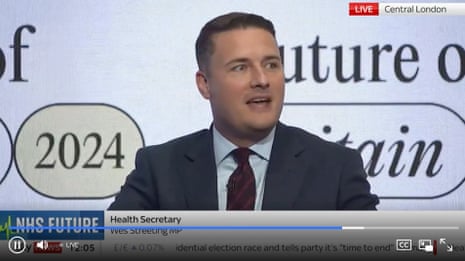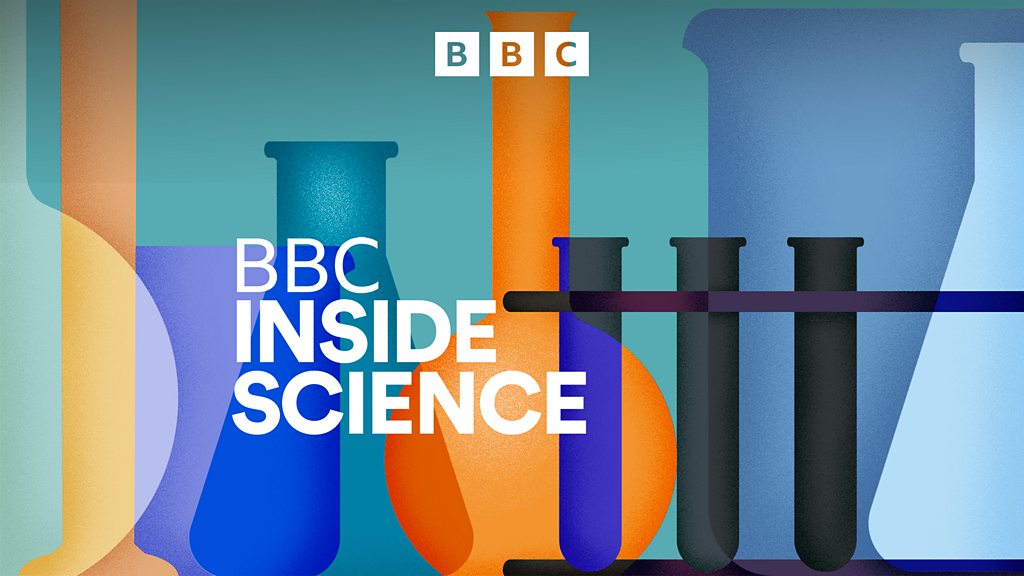Streeting ‘optimistic’ ahead of meeting with junior doctors over pay dispute – UK politics live | Politics
- Politics
- July 9, 2024
- No Comment
- 143
Streeting says he’s ‘optimistic’ ahead of talks with junior doctors about resolving ongoing pay dispute
Wes Streeting, the health secretary, has said he is “optimistic” ahead of talks with junior doctors aimed at ending their long-running dispute over pay.
Speaking at the Tony Blair Institute’s Future of Britain Conference, Streeting said:
I’m seeing the junior doctors this afternoon, they are coming into the Department of Health. I know they’re coming in not just from my diary, but from the army of cameras and journalists currently stationed outside the department.
Asked if he was optimistic about the talks, he said:
Optimistic? Yes.
This is an important reset moment in the relationship between junior doctors and their government.
Junior doctors say their pay should rise by 35% to restore it to the level it would have been if it had kept pace with inflation over the past 15 years. But Streeting said pay was not the only issue. He told the conference:
In opposition, we were very clear that the headline 35% pay demand is not one that we could afford, and that has not changed since the general election.
The reason we were so blunt in opposition wasn’t simply about delivering a tough message, but about showing them the respect I think they are due, and a key ingredient of respect is honesty.
Secondly, beyond pay, there are a whole range of issues about how junior doctors are treated by their employer which I am genuinely angry about – in terms of their placements, their rotations.
The most egregious case I saw reported was a junior doctor whose wife had cancer, they had two kids, and there was no flexibility shown in where that family was placed, despite the obvious challenges of treatment and the obvious challenges of care.
And when there was a public outcry, lo and behold, the situation was resolved.
That is not an employer that is treating their staff well – so I think there are lots of issues we can make progress.
As PA Media reports, the BMA’s junior doctors’ committee has said Labour comments about pay rises being a “journey and not an event” align with their pay restoration goals.
Health leaders urged the government to resolve the dispute as a priority after NHS England said 61,989 appointments, procedures and operations had been postponed as a result of the latest walkout from 27 June to 2 July. That was the 11th by junior doctors in 20 months.

Key events
Streeting says he wants to turn Department of Health into ‘economic growth department’
Wes Streeting has said that he wants to turn the Deparment of Health and Social Care into “an economic growth department”.
In his speech at the Tony Blair Institute’s Future of Britain Conference, Streeting said:
One of the things I’ve said to my department and to the NHS is we need to rethink our role in government, and in our country at large.
This is no longer simply a public services department. This is an economic growth department.
And the health of the nation and the health of the economy are inextricably linked. And that means we’re going to be a government that firstly recognises that fact, and recognises that as we get people not just back to health, but back to work, that’s a big contribution to growth.
This is not how the Department of Health has been seen in the past. But Streeting’s comments suggest he is fully aligned with Keir Starmer’s determination to lead a “mission-driven” government. The first, and most important, of Starmer’s five missions is securing the highest sustained growth in the G7, and mission-driven government is supposed to be about ensuring everything the government does is tailored around these goals, not just the work of the relevant government department.
Explaining how his department could promote growth, Streeting said:
I want to end the begging bowl culture, where the health secretary only ever goes to the Treasury to ask for more money. I want to deliver the Treasury billions of pounds of economic growth.
This government’s agenda for health and social care can help drag our economy out of the sluggish productivity and poor growth of recent years.
By cutting waiting lists, we can get Britain back to health and back to work, and by taking bold action on public health we can build the healthy society needed for a healthy economy.
We will make Britain a powerhouse for life sciences and medical technology. If we can combine the care of the NHS and the genius of our country’s leading scientific minds, we can develop modern treatments for patients and help get Britain’s economy booming.
The NHS and social care are the biggest employers in most parts of our country. They should be engines of economic growth, giving opportunities in training and work to local people, as well as providing public services.
When Keir Starmer said he would lead a mission-driven government, this is what he meant.
Lord Frost tells PopCons conference Tories lost election due to their ‘mishmash of sub-socialist ideas’

Peter Walker
A post-election gathering of the Liz Truss-ite wing of the Conservatives has been told that Reform poses an “existential threat” – and that the solution is for the party to move to the right and take back their voters.
With every MP associated with the Popular Conservatism (“PopCons”) group losing their seat, Truss among them, the gathering-cum-inquest heard from a former MP, Jacob Rees-Mogg, two Tory peers, David Frost and Daniel Hannan, and assorted others. (See 12.35pm.)
The one sitting Commons member appearing, Suella Braverman, was not previously part of the group and appeared in a recorded video from Washington DC, where she had been making a controversial speech to another event.
It was Braverman who called Reform an existential threat, saying millions of Conservative voters “are now their voters”, and would only be brought back by the Tories pledging to quit the European convention on human rights, abolishing the Equalities Act and tackle the “lunatic woke virus working its way through the British state”.
This was strong stuff, and matched by several other speakers, among them Frost, who complained that his party had “followed the collectivist zeitgeist leftwards” and presented policies that were “a flabby mishmash of sub-socialist ideas”.
Manifesto policy was not the only topic discussed at the event in Westminster, and it also featured much slightly niche, if very necessary, discussion of how to better energise and engage Tory members, and give them more say over a dictatorial Conservative central office.
But a certain amount of the policy talk risked being filed under “no compromise with the electorate”, with talk about “educating” the electorate that was reminiscent of some internal Labour discussions in the 1980s. It was notable, too, with all the talk about Margaret Thatcher’s mentor, Keith Joseph, and the sovereignty of parliament, how much more ideological it felt than Keir Starmer’s Labour.
There was, however, also much realism. “We are now in opposition. We have no power,” Rees-Mogg began. Monday’s reshuffle of the Tory frontbench “doesn’t matter”, he said, bluntly.
To his former ministerial colleagues, he added: “The car doesn’t move, the chauffeur has gone, the red boxes have gone.” It was, he said, time for “humility but not despair”.
A number of children have been brought ashore in Dover as migrants continued to cross the English Channel on Tuesday, PA Media reports. PA says:
People arrived on Border Force and RNLI lifeboats after making the journey amid calm sea conditions despite the overcast and rainy weather.
Pictures showed youngsters among the group of people wearing life jackets, and some wrapped in blankets, as they came into the Kent port.
Monday saw 65 people make the journey in one boat after a six-day pause in activity – the first crossings since Labour’s election victory.
The five Reform UK MPs turned up at the Commons together for the first time this morning. Here they are posing for a photograph.
Streeting says he’s ‘optimistic’ ahead of talks with junior doctors about resolving ongoing pay dispute
Wes Streeting, the health secretary, has said he is “optimistic” ahead of talks with junior doctors aimed at ending their long-running dispute over pay.
Speaking at the Tony Blair Institute’s Future of Britain Conference, Streeting said:
I’m seeing the junior doctors this afternoon, they are coming into the Department of Health. I know they’re coming in not just from my diary, but from the army of cameras and journalists currently stationed outside the department.
Asked if he was optimistic about the talks, he said:
Optimistic? Yes.
This is an important reset moment in the relationship between junior doctors and their government.
Junior doctors say their pay should rise by 35% to restore it to the level it would have been if it had kept pace with inflation over the past 15 years. But Streeting said pay was not the only issue. He told the conference:
In opposition, we were very clear that the headline 35% pay demand is not one that we could afford, and that has not changed since the general election.
The reason we were so blunt in opposition wasn’t simply about delivering a tough message, but about showing them the respect I think they are due, and a key ingredient of respect is honesty.
Secondly, beyond pay, there are a whole range of issues about how junior doctors are treated by their employer which I am genuinely angry about – in terms of their placements, their rotations.
The most egregious case I saw reported was a junior doctor whose wife had cancer, they had two kids, and there was no flexibility shown in where that family was placed, despite the obvious challenges of treatment and the obvious challenges of care.
And when there was a public outcry, lo and behold, the situation was resolved.
That is not an employer that is treating their staff well – so I think there are lots of issues we can make progress.
As PA Media reports, the BMA’s junior doctors’ committee has said Labour comments about pay rises being a “journey and not an event” align with their pay restoration goals.
Health leaders urged the government to resolve the dispute as a priority after NHS England said 61,989 appointments, procedures and operations had been postponed as a result of the latest walkout from 27 June to 2 July. That was the 11th by junior doctors in 20 months.
My colleague Peter Walker has been at the Popular Conservatism (sic) conference today. This is the rightwing group launched by Liz Truss and her supporters, but Truss herself is not speaking today and, judging by one of Peter’s pictures, the sketchwriters almost outnumber the normal attendees.
Scene for today’s Popular Conservatism post-election gathering in Westminster. We can all make the jokes about “popular”, but it’s 20 mins before it starts, and a fairly decent crowd for a weekday work-time event. pic.twitter.com/UnapEpX9HZ
— Peter Walker (@peterwalker99) July 9, 2024
Scene for today’s Popular Conservatism post-election gathering in Westminster. We can all make the jokes about “popular”, but it’s 20 mins before it starts, and a fairly decent crowd for a weekday work-time event.
Where the “popular” element does have more sting is electorally: every one of the Pop Cons’ MPs, including Liz Truss, lost their seats last week. We are hearing from one MP, Suella Braverman (via video link from the US), but she was not previously part of the group.
First speaker, former IEA head honcho Mark Littlewood, kicks off the event with a joke about the one advantage of being a diminished party means they can hold an event “without being serenaded by Steve Bray”.
Steve Bray, aka “Mr Stop Brexit”, the protester who almost drowned out the Rishi Sunak speech announcing the election playing Things can only get better through a loudspeaker, is normally outside Parliament on big days. But there was no sign of him when I came in this morning. Maybe he considers his work is done.
Mark Littlewood dismisses the idea of the Tories needing to shift to the centre. He says Reform did so well because the Tories had “vacated Conservative territory”. He adds that the defeat “is not Nigel Farage’s fault”.
Littlewood says the Tories need to “listen to the right of centre and electorate much more attentively”. My guess is that blue wall ex-Tories who went Lib Dem this time might consider themselves “right of centre”. But is there anything here for them? Not as yet.
Next up is Daniel Hannan, who argues that one big Tory error was to change leaders twice without an election. This was “catastrophic”, he says, giving the message, “you little voters will put up with whatever we tell you”. pic.twitter.com/NVfmSqyiLU
— Peter Walker (@peterwalker99) July 9, 2024
Next up is Daniel Hannan, who argues that one big Tory error was to change leaders twice without an election. This was “catastrophic”, he says, giving the message, “you little voters will put up with whatever we tell you”.
David Frost is finally breaking his long silence about what the Conservatives should do next. [niche joke]
Frost says the Tories’ mistake was to “follow the collectivist zeitgeist leftwards”. Frost says “the electorate is never wrong”, but at the same time there still has been no mention of all the centrist Tory voters who delivered so many seats to the Lib Dems last week.
Suella Braverman is not even talking live to the PopCons, but recorded a video message last night.
Braverman said the Conservatives failed because they failed to cut taxes or stop the “lunatic woke virus working its way through the British state”.
Primary school pupils in England still behind pre-Covid levels of attainment, Sats results show

Richard Adams
Children finishing primary school in England this year are still struggling to catch up with pre-pandemic levels of attainment in maths and literacy, according to the Sats results published today by the Department for Education (DfE).
The results from pupils at the end of Year 6 showed that 61% met the DfE’s expected standards in reading, writing and maths, a slight improvement on the 60% who did so last year but still below the 65% recorded in 2019.
Maths in particular remains lower than before the pandemic, with 73% reaching the standard this year compared with 79% in 2019.
Catherine McKinnell, the schools minister for England, said:
Despite the brilliance of our teachers, these figures show there are far too many pupils who are not meeting the expected standard in reading, writing and maths, and almost total stagnation in progress nationally over the past three years.
This government will give teachers and families the support their efforts deserve and make sure every child leaves primary school with strong foundations for future learning.
Rightwingers don’t have clear majority in Tory parliamentary party, research suggests
Earlier this week we reported that Suella Braverman is increasingly seen by Tories as having no chance of being elected next leader. But she is not going down without a fight. Speaking to the Telegraph, she dismissed Robert Jenrick, one of her rivals, as a leftwinger. As Tony Diver reports in his story, Braverman said:
[Jenrick] definitely comes from the left of the party. He voted for remain in the Brexit referendum. He was a big, kind of centrist, Rishi supporter.
I remember talking to him about leaving the ECHR a year ago, and him looking horrified by that prospect. It’s really good that he’s moving in a different direction.
Another problem for Braverman is that the assumption that a landslide defeat would leave the parliamentary Conservative party more rightwing than it was before seems to be wrong. Christian Calgie from the Express has been analysing the politics of the 121 Tory MPs who were elected and almost half of them are centrists. And a fifth are new members who are hard to place.
NEW: Digging into the data about who the remaining 121 Tory MPs backed in 2022 suggests there’s going to be a lot of noise and heat in the battle for the right, while Tugendhat may have a quiet and easy ride into the final two run-off pic.twitter.com/KZcFrIlrwg
— Calgie (@christiancalgie) July 8, 2024
NEW: Digging into the data about who the remaining 121 Tory MPs backed in 2022 suggests there’s going to be a lot of noise and heat in the battle for the right, while Tugendhat may have a quiet and easy ride into the final two run-off
47% of sitting Tory MPs backed either Sunak, Mordaunt or Tugendhat – Penny’s defeat makes the path even easier for TT While 17% backed Liz Truss, and just 12% backed the ‘cultural conservatives’ including Patel, Braverman and Badenoch
What else does this tell us? That the leadership hopefuls better get working on the 26 new intake Tory MPs stat if they want to make it to the final two.
It also suggests there could be more trouble ahead. Conventional wisdom suggests Tory members will pick the most right-wing candidate, but if nearly half of MPs prefer the centrist just *18* MPs are required under current rules to spark a vote of no confidence
Only 18 MPs would be required to trigger a leadership challenge because, under the current rules, 15% of MPs need to write to the chair of the 1922 Committee to trigger a no confidence vote in the leader. But the 1922 Committee can change these rules quite easily. Currently the committee does not have a chair, but Tory MPs are expected to elected on today. The two main candidates are Bob Blackman and Geoffrey Clifton-Brown.
Keir Starmer posed for a photograph with the new intake of Scottish Labour MPs outside No 10 this morning.
Speaking after the meeting of metro mayors in Downing Street, Kim McGuinness, the Labour North East mayor, said that having multi-year funding deals would make a big difference.
Asked what changes the mayors were requesting, she said:
Everybody’s got a different devolution deal, but it is simple things like single funding settlements over multi years so that we’re able to have more control of how we spend our money to get more out of what we’re doing.
We want to see more houses being built, and some of the constraints removed in order to do that around things like planning and funding of housing.
And for areas like mine, I really want to be bringing our buses back under public control.
Suella Braverman criticised for saying flying of Progress Pride flag was ‘monstrous thing’
Suella Braverman has attacked “liberal Conservatives”, saying she was angered by the flying of the Progress Pride flag in her department as UK home secretary, calling it a “monstrous thing”. Jessica Elgot has the story.
The proportion of primary school pupils in England who met the expected standard in this year’s Sats exams has risen slightly on last year but remains below pre-pandemic levels, PA Media reports. PA says:
The key stage 2 results, which assess attainment in literacy and maths in Year 6 in schools, showed 61% of pupils met the expected standard in reading, writing and maths combined, up from 60% in 2023.
In 2019, 65% achieved the expected standard.
The former Conservative government had set out an ambition for 90% of children in England to leave primary school at the expected standard in reading, writing and maths by 2030.
In individual subjects, scores were higher than last year, or the same.
#Streeting #optimistic #ahead #meeting #junior #doctors #pay #dispute #politics #live #Politics








